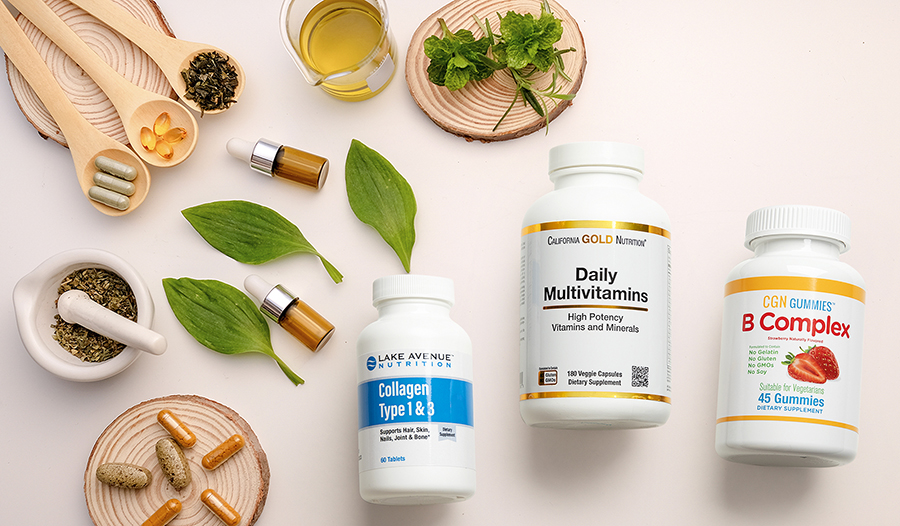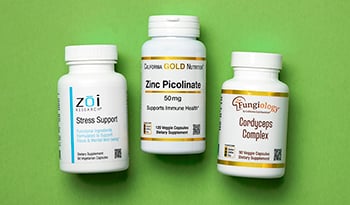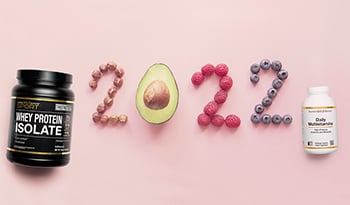7 Must-Have Natural Health Products for 2022
DISCLAIMER:This blog does not intend to provide diagnosis...
- In this article:
- 1. Inositol
- 2. Collagen
- 3. Vitamin B1 (Thiamin)
- 4. Vitamin B6 (Pyridoxine)
- 5. Vitamin D
- 6. Multivitamins
- 7. Omega-3s

If you’re wondering what to get a loved one for the holidays or what to treat yourself to in the New Year, I’m here with some recommendations! These products are some of the most recommended by naturopathic doctors and can help keep you and your loved ones healthy in the New Year.
1. Inositol
Inositols are glucose isomers that were once thought to be B vitamins. When taken as a supplement, they have an intensely calming effect. They can be used to improve insulin sensitivity and hormone signaling in people with hormonal dysfunction, particularly PCOS. Inositols have no toxic dose, no side effects, and many benefits, including their antioxidant potential. It’s why I tell all of my clients about them!
Inositol is part of the mental health first aid kit that I recommend to my clients to keep in their pantries, because a big dose of inositol at once can often help to stop a panic attack in its tracks. While you should always figure out the root cause of anxiety and work with a naturopathic or functional medicine doctor to get rid of it from the source, inositol can be a great part of a natural mental health healing plan and it’s fairly inexpensive.
You can take inositol as a powder or in pill form. You can mix the powder in your water and sip it throughout the day—the amount you should take depends on your health history and needs. As always, check-in with your medical professional before starting this supplement, but once you have the all-clear, enjoy the extra calm and improved hormonal health you experience as a result!
2. Collagen
Ever wonder what gives skin a healthy, plump appearance? In part, it’s an abundance of collagen, which retains moisture and helps give our skin a firm texture that minimizes wrinkles. Collagen is made of vitamins, minerals, and amino acids. It’s a bundle of nutrients that is hard to get from individual supplements or plant foods. The best way to get it is to actually eat collagen straight from another mammal or fish, by taking their collagen and drying it into a powder or consuming it in the form of bone broth. If you’re connected enough to your ancestral ways of eating, you may also have grown up seeing your elders chew on the clear, cartilaginous material attached to animal bones. That’s also a legitimate way of consuming more collagen!
Luckily, modern food manufacturing methods have made consuming collagen easy, tasty, and even sweet. You can use powdered collagen in your hot liquids or smoothies, add collagen creamer to coffee, or even take it as a collagen pill. Collagen is made from fish or animal bones or hide, so it’s not vegan. If you’re vegan and want to boost collagen production, try a vegan collagen builder supplement, which contains all of the ingredients needed to build healthy collagen and keep skin moist and healthy.
3. Vitamin B1 (Thiamin)
Thiamin is depleted by alcohol consumption, and it’s difficult to get enough of it each day through food since the top food sources of it are pork chops, trout, and black beans. You can also get it through enriched rice, enriched cereals, and enriched egg noodles. If you don’t consume these often, or consume alcohol frequently, you could be at risk of a thiamin deficiency. For that reason, I recommend that my folks who like to drink also take thiamin regularly. There are a number of ways to do this. You can get a B1 supplement, liver support supplement that contains B1, or multivitamin with at least 1mg of thiamin in it.
4. Vitamin B6 (Pyridoxine)
Vitamin B6 or pyridoxine is required for over 100 different enzymatic reactions in the body, including ones that we use to build proteins and keep our blood sugars stable. B6 is also required for estrogen metabolism and to make dopamine and adrenaline, as well as our major detoxification compounds like glutathione. It can help to reduce bloating and discomfort during the luteal phase (the two weeks before menstruation) and improve PMS symptoms naturally. I’ve also found that it helps to improve a depressed mood when there’s a history of inadequate consumption of this vitamin in the diet.
The top food sources of B6 are chickpeas, beef liver, tuna, salmon, and chicken breast. If you don’t eat these often, then supplementing with B6 is a good strategy for staying healthy long-term. B6 can be obtained in most multivitamins, but the best form to use is pyridoxal-5-phosphate, or P5P, because it is the easiest form of B6 for the body to absorb and use. The RDI for B6 is 1.5mg a day for most adults, so make sure you’re consuming at least this much to make a difference in your health. Because B6 is water-soluble, we don’t store it, so take your supplement each day or commit to eating enough food sources of B6 to meet your daily requirements. Then, enjoy all of the health benefits that come with it!
5. Vitamin D
Vitamin D is the #3 vitamin deficiency in the U.S., with between 8-30% of individuals estimated to be deficient or insufficient. That’s not shocking, since vitamin D comes from cod liver oil, trout, and salmon, as well as the sun, and many Americans do not consume enough of these foods or spend enough time outside. I’ve written a blog post on how to balance vitamin D and sun safety that you should read if you’re someone who tries to make their own vitamin D from sunlight. But, it’s better to take a supplement if you’re not sure you’ll be able to consume enough vitamin D each day.
6. Multivitamins
We just talked about a lot of vitamins, and you could end up buying three different pills for each if you’re not careful. This is why multivitamins were invented, to package up the most frequently needed vitamins into one pill. While you shouldn’t rely on a multivitamin in place of food to get you nutrients, it’s great nutritional insurance for the days you just can’t eat enough food to meet your micronutrient needs.
If you’re among the folks in the world who think (like I used to) that’s it’s easy to get all of your vitamins, minerals, amino acids, fiber, and omega 3’s each day from food, I invite you to track your food for one day using a nutrient tracker like Cronometer or MyFitnessPal. You’ll be shocked at how hard it is to meet 100% RDI of every nutrient in just three meals and two snacks. For that reason, I recommend a multivitamin “just in case.” It can’t hurt, and they do help! Research shows, for example, that supplementing with vitamin D and B vitamins improves blood levels of these nutrients in people who take supplements regularly. This has profound impacts on health, for usually a few cents a day.
Take a multivitamin each day with lunch or dinner to avoid nausea that they can cause when taken on an empty stomach, and try not to take them right before bed, as the B vitamins they contain can be stimulating. If you’re someone who can’t take pills, consider a gummy multivitamin or liquid multivitamin.
7. Omega-3s
Omega-3s keep our cell membranes flexible, make up a large portion of the healthy fats in our nerves and brains, and keep inflammation under control. They’re an often-overlooked part of healthy diet plans and many people do not consume enough of the top sources of omega 3s in their diet, including flaxseed, chia seeds, walnuts, and salmon. Thankfully, it’s easy to take omega 3s as a pill.
I recommend at least 1-2 grams each day in addition to consuming lots of food sources of omega 3s, depending on your health history. You should ask your doctor how much omega-3 is right for you, particularly if you have a bleeding disorder or surgery coming up, as omega 3s can interfere with clotting. If you’re looking for more easy ways to include omega 3s in your diet, consider adding chia and flax to baked goods, consuming walnuts in trail mixes or as a snack, and making tasty dinners with salmon as the main feature.
References:
- Centers for Disease Control and Prevention, et al. CDC’s Second Nutrition Report: A Comprehensive Biochemical Assessment of the Nutrition Status of the U.S. Population Report Measures 58 Indicators of Diet and Nutrition New Report Uses NHANES Results. 2012.
- “Office of Dietary Supplements - Omega-3 Fatty Acids.” Nih.gov, 2015, ods.od.nih.gov/factsheets/Omega3FattyAcids-HealthProfessional/. Accessed 20 Oct. 2021.
- “Office of Dietary Supplements - Thiamin.” Nih.gov, 2013, ods.od.nih.gov/factsheets/Thiamin-HealthProfessional/. Accessed 20 Oct. 2021.

 By Dr. Kate Henry, N.D.
By Dr. Kate Henry, N.D.


